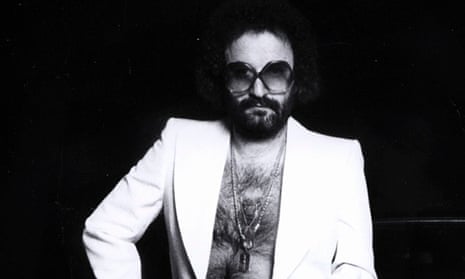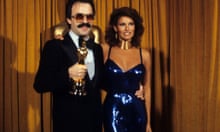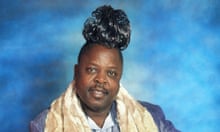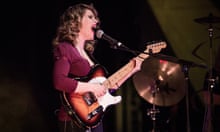If you weren't familiar with the life and career of the producer and songwriter Giorgio Moroder from his work, the song Giorgio, by Moroder, on Daft Punk's last album Random Access Memories, should have given you a crash course.
The Guardian’s product and service reviews are independent and are in no way influenced by any advertiser or commercial initiative. We will earn a commission from the retailer if you buy something through an affiliate link. Learn more.
On the nine-minute number, Moroder, 74, talks about his early ambitions, the concept behind his groundbreaking Donna Summer production I Feel Love, and finally his musical philosophy ("Once you free your mind about a concept of music and harmony being correct, you can do whatever you want"), as Daft Punk pay musical homage to his achievements. They move through supper-club disco to pulsing electronica, a panoramic string and synthesiser crescendo, and finally rest on the metronomic beat of house and techno, both genres that would be inconceivable without Mororder's 70s and 80s work.
However, the song doesn't squeeze in his three Oscars (for the sountracks of Scarface, Flashdance and Top Gun), his productions for the likes of Blondie, David Bowie and Freddie Mercury, or, erm, his remix for Coldplay last month. For those who want to know more, Moroder is appearing at Vivid festival in Sydney on Sunday – his first visit to Australia. He's being interviewed on stage, and then at the Sydney Opera House the Heritage Orchestra will play a selection of his hits. After that he will DJ in the Opera House's studio space.
"I play Love to Love You Baby, Macarthur Park, Flashdance, Take My Breath Away, songs from The Neverending Story –it’s 70% my songs," says Moroder down the phone from his home in Los Angeles, where he has lived for 35 years after leaving Munich, where he first started making records.
Which song goes down the best? "Probably Hot Stuff or Call Me – I take the volume down and they all sing the chorus."
Moroder seems a lot more sanguine about his back catalogue than his fans. When I mention the guitar solo in Together With Electric Dreams, his 1984 hit with Phil Oakley of the Human League, he has trouble remembering it. "With my 300, 400 songs I’ve recorded, I know for sure there's a solo on Hot Stuff because I just heard it a few minutes ago, but I listen to my own music very little. The problem with this whole DJ [thing] is that I have to listen to an hour and a half of my music, over and over."
Besides his Daft Punk appearance and that Coldplay remix ("Who does not want to work with one of the best groups in the world?" he asks), Moroder is still making records. One of pop's few indisputable pioneers, he nevertheless believes that there are still new sounds to be discovered. His forthcoming album will include collaborations with young electronic musicians including Skrillex – "What he’s doing now is absolutely incredible."
However, his favourite remains Love to Love You Baby, the 1975 disco epic. Over 17 sexually charged minutes, Donna Summer moaned and groaned her way to stardom, taking Moroder with her. "That’s the record that made my career and hers and if I hear it now it’s still a good recording," he says proudly.
He and Summer were still close at the time of the singer's death in 2012 – she lived in the apartment underneath him for three years: "I would see her once a week and have dinner and talk – it was nice, like family."
Summer didn't reveal that she had cancer: "My wife had much more of a premonition that something was wrong. First of all she lost a lot of weight. I would say, ‘Wow, how are you losing weight?’ and she would tell me, ‘I drink healthy stuff and you should do it, too.' Then I was supposed to go on tour with her, but then she said no, she cannot fly. So when she died it was a surprise but not a big surprise."
Back in the late 70s, having caused such a massive splash with Summer, the production and co-writing requests rolled in, not just from disco acts but rock bands. In 1979 Moroder made the album No 1 in Heaven with Sparks, previously glam rockers, but who under his direction changed their sound to electronic disco. Sparks once said that Moroder was a hard taskmaster; they would give him 20 songs and he would reject 19 of them and then said he liked only the middle eight of the 20th.
"I don’t remember them giving me 20 and secondly I don’t remember picking only one," chuckles Mororder. "If you have the choice of picking one song from 20, that’s quite nice. For the show I’m not playing No 1 in Heaven, I’m playing Beat the Clock – people love that one. They’re all quite interesting, the songs with Sparks. That was a real fun project."
Making the song Love Kills with Freddie Mercury (part of a new soundtrack Moroder wrote for Fritz Lang's Metropolis) was more fraught. "We had a little bit of a problem with the lyrics. I usually have the last word but with Fred I did not fight because he was not only such a great lyricist and composer but also pianist, singer and vocalist. But he was not an easy guy to work with."
Perhaps Mercury was abashed by Moroder's moustache, which back in the disco days was even more luxuriant than his own. It's a visual trademark that has waxed and waned. "Until about a year ago I was clean like a baby, and then my wife said, ‘Oh, you have to have at least a little one’ so I have a mini one, by far not as big as the one I had." Just as disco has returned, so has Moroder's moustache, although both are less excessive than the first time round.




Comments (…)
Sign in or create your Guardian account to join the discussion